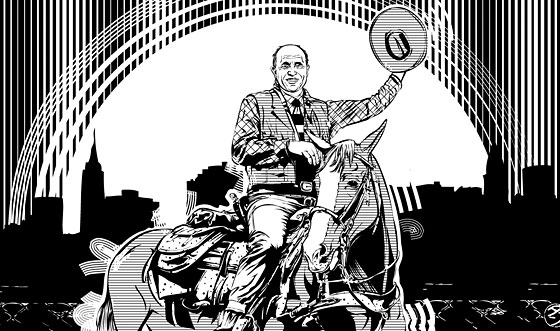
Neither race ever seemed realistic. Set aside the campaign part for a second and picture the possible results if he’d run and won: Rudy as merely one of 100 legislative blowhards in the U.S. Senate, and near the bottom of the seniority totem pole? Judi in Albany?
Those scenarios were always impossible to imagine. And the nuts-and-bolts calculations make complete sense: If Rudy Giuliani had challenged Kirsten Gillibrand, he would have been an ethnic downstate Republican man battling an incumbent upstate woman in a Democrat-dominated state. His most likely opponent in a race for governor, Andrew Cuomo, has a huge head start in cash and momentum. Jumping into either fight would have severely dented the lucrative income from Giuliani’s lecturing-and-consulting business. So last week he made it official, endorsing former congressman Rick Lazio as the Republican candidate for governor and declaring he won’t run for anything himself in 2010.
Yet the speculation was misguided all along for a more fundamental reason: It was premised on a Rudy who disappeared a long time ago. The guy who helped save the city by challenging orthodoxies on crime and whose own complicated personal life informed his public broad-mindedness was last sighted in about 1996. Giuliani’s grace, eloquence, and resoluteness was a great gift to the city in September 2001. But that nuanced character would have had to make a comeback if Rudy were going to stand a realistic chance of winning in left-of-center New York. And it has been more than a political lifetime since the tough-but-thoughtful Giuliani ran for office.
Some combination of searing personal loss on September 11 and the ego-inflating international stardom that followed the terrorist attacks—plus the contortions required to pander to social conservatives in Republican presidential primaries—turned Giuliani nearly unrecognizable to anyone who watched him run for mayor in 1993. He kept enthusiastically serving up red meat even after his presidential campaign flopped, with his gleeful mocking of “community organizer” Barack Obama a particular low point. Perhaps he could have morphed back into the old, pre–“America’s Mayor” Rudy whose bullying side was balanced by his creative, non-ideological political thinking. The state might have benefited: New York’s best shot at ever having a functional state government again begins with vigorously contested elections at every level. Giuliani would have energized either race and forced a real discussion about competing visions of New York’s future. But that would have required the return of mainstream Rudy. Perhaps Giuliani is genuinely too busy drawing up security plans for the 2016 Olympics in Rio. Or maybe he, better than anyone, knew there was no turning back the clock.
Giuliani won’t disappear, of course. The Obama administration’s decision to hold some of the 9/11 trials in New York gives him a cost-free platform for at least the next two years. Unfortunately, that forum also plays to his recent incarnation, the one-note Rudy who taunts Democrats as incapable of speaking the words “radical Islamic terrorism.”
A statewide run, for either job, would have been a fascinating test to see if that other guy—the intriguingly multifaceted, full-of-promise Rudy who made it palatable for Upper West Side liberals to vote for a Republican—is still in there somewhere. But it’s harder and harder to imagine we will ever see him again. Instead, City Hall’s streak as the graveyard of political careers is at 141 years and counting.
Have good intel? Send tips to [email protected].